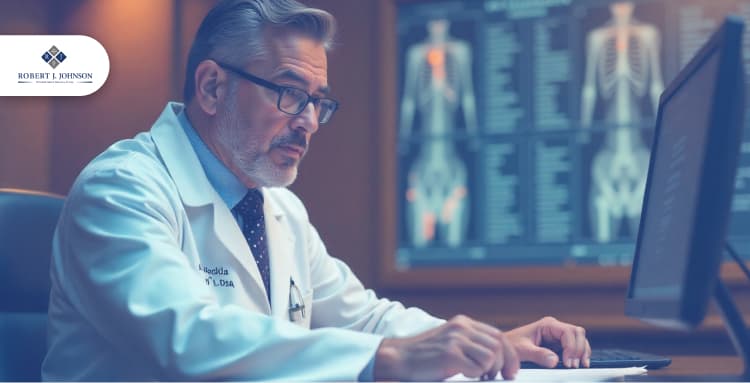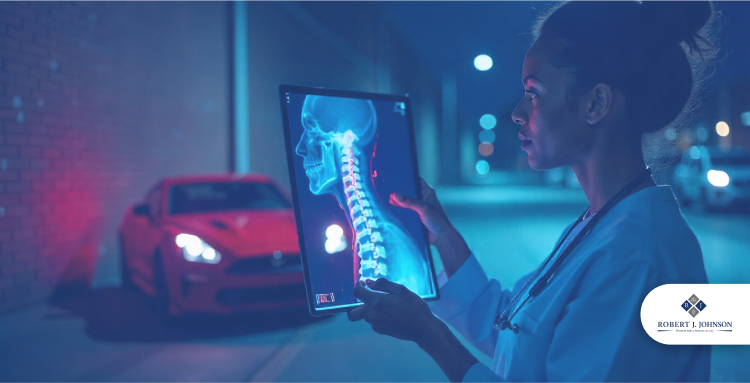
July 28, 2025
What Role do Medical Experts Play in a Personal Injury Case
We don't often think about the human body until it's been broken. A sudden crash, a fall, a sharp pain that wasn’t there yesterday—it’s in those moments that reality bites hard. The courtroom, then, becomes more than a legal battleground; it turns into a space where suffering must be measured, explained, and justified. And in this strange theater of injury and evidence, the medical expert steps onto the stage—not as a healer this time, but as a translator of pain.
If you’ve been hurt and are fighting for justice in Florida, you’ll soon realize that your doctor’s word might carry just as much weight as your lawyer’s. Let’s talk about why that is.
1. Establishing Causation: Connecting the Injury to the Accident
In any personal injury case, especially here in Florida, establishing causation is one of the most critical pieces of the legal puzzle. It's not enough to simply say you were injured—you have to prove that your injuries were caused by the accident in question.
A medical expert's role is to draw a clear, credible link between the accident and the injuries you sustained. Suppose you're claiming a back injury after a car crash; the court needs to know whether that pain is actually from the crash and not from a pre-existing condition or a prior incident. A medical expert will examine your records, perform evaluations, and explain—often in great detail—how the mechanics of the accident likely led to your current physical condition.
This process of connecting the dots is known as causation, and it’s a requirement for proving liability. Under Florida law, the injured party (that’s you) has the burden of proof. That means it’s your responsibility to show that the defendant’s negligence was the direct cause of your injuries. Without this link, the case falls apart—no matter how severe the injury may be.
2. Diagnosing and Evaluating Injuries

Once causation is established, the next question becomes: How serious are the injuries, and what do they mean for the injured person’s future?
Medical experts begin by conducting thorough evaluations. They review emergency room records, perform physical examinations, order diagnostic tests like MRIs or CT scans, and assess whether the injury has worsened over time. Their insight goes beyond surface-level symptoms. For instance, a patient complaining of headaches after a fall may be diagnosed with a mild traumatic brain injury—something that wouldn’t show up without a professional assessment.
Common injuries they see in personal injury cases include soft tissue damage like whiplash, broken bones, spinal cord trauma, internal bleeding, and head injuries. However, each injury comes with its own set of complications. A fracture might heal in weeks, while nerve damage or a brain injury could lead to years of cognitive or physical limitations.
3. Quantifying Damages: Calculating Medical Costs and Future Care
Understanding what happened to your body is only part of the equation. The other part—the one that hits your wallet—is figuring out what it’s all going to cost.
They begin by identifying all medical expenses directly tied to the injury. This includes everything from ER visits and imaging scans to physical therapy and prescription medications. But the real value of their testimony comes in projecting the future. If an injury is long-term or permanent, they’ll outline what kind of treatments or assistive devices you’ll need moving forward—like mobility aids, ongoing pain management, or follow-up surgeries.
This forward-looking analysis is critical in Florida personal injury cases because once a settlement or verdict is reached, you don’t get to go back and ask for more money later. The compensation you receive has to cover not just today’s bills, but tomorrow’s too.
Medical experts also work closely with vocational experts and economists to help estimate how an injury might affect your ability to earn a living. For instance, if you were in a physically demanding job before the accident and now can’t lift more than 10 pounds, that’s going to impact your income potential. A doctor’s testimony on your physical limitations can support claims for lost wages—not just short-term, but for the rest of your working life.
4. Reviewing Medical Records and Providing an Objective Analysis

Medical experts know how to read between the lines, flag inconsistencies, and provide a clear, unbiased interpretation of what your records actually show.
Their job isn’t to advocate—they’re there to inform. A qualified expert will review ER notes, imaging reports, specialist evaluations, and even past medical history to ensure the narrative holds up. They look at timelines: Did symptoms show up immediately after the accident, or was there a delay? They assess whether the treatment provided matches the type and severity of the injury. And if there are gaps—missed appointments, unusual delays in seeking care—they can explain how that might (or might not) impact the case.
This objective lens is especially important when the defense tries to argue that your injuries were pre-existing or exaggerated. A medical expert can either confirm that the current condition is a direct result of the accident or help clarify whether an existing issue was aggravated by it. Either way, their insight strengthens the credibility of your claim.
5. Medical Experts in Court: Testifying and Explaining Complex Medical Details
When a case goes to trial, facts alone aren’t always enough. The courtroom is a place where clarity wins—and that’s exactly what a medical expert brings when they take the stand.
Medical experts act as translators of your injury. They break down complicated concepts like nerve compression, spinal misalignment, or post-concussion syndrome in a way the judge and jury can grasp. They explain how the injury occurred, what the treatment entailed, and what kind of lasting impact it may have. Most importantly, they do this in everyday language without watering down the science behind it.
For example, a neurologist might testify about the effects of a mild traumatic brain injury and why a client appears “fine” on the outside but struggles with memory, mood, or motor skills. Or an orthopedic surgeon could walk the jury through X-rays and explain how a fracture might never heal the same way again, affecting movement and strength.
In Florida, expert testimony must meet what's known as the Daubert standard, which essentially means the expert’s opinions must be based on reliable principles and methods. So it’s not just about having a medical degree—it's about using well-established science to support your case.
Get More Useful Insights about Personal Injury Below:
How Robert Johnson Maximizes the Value of Medical Expert Testimony

When you're recovering from an injury, the last thing you should worry about is how to explain your pain in medical or legal terms. That’s our job. At our firm, we work hand-in-hand with trusted medical experts to make sure your story is told clearly, accurately, and powerfully.
From the moment we take on your case, we’re focused on the details that matter—starting with your health. We bring in experienced doctors who can properly evaluate your injuries, document the facts, and provide testimony that holds up in court. These experts don’t just confirm that you’re hurt—they help us show how the accident changed your life and what kind of care you’ll need going forward.
We also know how to connect the dots. It’s not just about medical records—it's about using those records to prove causation, demonstrate damages, and fight for the full compensation you deserve. Whether it’s calculating future medical costs, proving lost earning potential, or standing up to an insurance company that’s trying to minimize your claim—we’re ready.





































































